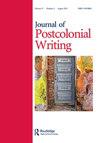The aqueous form and the Afro–Sino encounter in Yvonne Owuor’s The Dragonfly Sea
IF 0.4
3区 文学
0 LITERATURE
引用次数: 0
Abstract
ABSTRACTThrough a focused study of Kenyan writer Yvonne Owuor’s The Dragonfly Sea, this article seeks to develop an aqueous hermeneutics of Africa–China literatures. Such a reading practice highlights the waterways that fundamentally shape Afro–Sino relations but have not been properly theorized in oceanic studies or Global South studies and challenges the ways we think about global connectivity and its associated genre – world literature. Owuor uses an aqueous form to tackle the Afro–Sino encounter’s complex temporalities – its maritime connections in antiquity, its present moment in capitalist modernity, and its unpredictable futures. Furthermore, her novel draws on water’s materiality to respond to the unevenly powered global literary market. Using Owuor as a starting point, this article considers whether the Indo-Pacific waters might offer a generative frame for cross-cultural comparisons, complicate the dominant paradigm of Afro–Sino literary studies, and integrate Chinese/sinophone maritime fiction and Indian Ocean literature of the anglophone and francophone worlds.KEYWORDS: Oceanic studiesAfrica–China relationsGlobal South studiesYvonne OwuorKenyan literatureIndo-Pacific waters Disclosure statementNo potential conflict of interest was reported by the author.Notes1. See, for example, Charne Lavery (Citation2017). This article also aims to bring together the Indian Ocean and Pacific worlds, and explores how bridging the two oceans might complicate our understanding of south–south solidarity. However, by contrast, Lavery analyses more how the south writes back to the north.2. Africa’s oceanic tie with the Caribbean and the Indian Ocean world, in the form of transatlantic slavery or indentured servitude, is well documented in Atlantic studies and Indian Ocean studies. For a discussion of how literatures represent the South Seas (Nanyang) in East Asian studies, see Brian Bernards (Citation2015).3. Karen Laura Thornber’s (Citation2016) study highlights travel of people and ideas between Africa and China from the 8th century to the present, but hardly mentions the ocean space that enables these journeys. Thornber also notes that the transportation of slaves and labourers between Africa and China during European imperialism is a rarely discussed topic (703), a research gap that justifies a hydro-critical reading of Afro–Chinese relations. (Re)visiting those interactions from the Indo-Pacific waters might help salvage minor (hi)stories that remain illegible to the terrestrial mind.4. Unless otherwise noted, translations of French and Chinese texts in this article are my own.5. After defaulting on its loans in late 2017, the Sri Lankan government negotiated with China and “handed over the [Hambantota] port and 15,000 acres of land around it for 99 years” (Abi-Habib Citation2018). East African countries like Djibouti have mounting debts with China and are faced with similar situations (Gopaldas Citation2018).6. This article refers to a different ocean from Baucom’s, whose reflection on historical philosophy stems from the specific context of the Middle Passage. However, capitalism and its regulation of space-time are global phenomena whose influence permeates both the Atlantic and Indian Ocean worlds.7. For instance, when studying the relations between Victorian fiction and Darwinian thought, George Levine (Citation1988) suggests that “Victorian gradualism” was manifested at the scientific, political, and aesthetic levels and “was the groundwork of 19th-century ‘realism’” (5). For Georg Lukacs (Citation1964), realism is a genre fundamentally about human agency and human history. In the realist novel, the individual establishes an “organic, indissoluble connection” with society. “The central aesthetic problem of realism”, Lukács argues, “is the adequate presentation of the complete human personality” (7–8).Additional informationNotes on contributorsSiwei WangSiwei Wang is a PhD student in Comparative Literature at Princeton University. Previously, she obtained an MA in English at Georgetown University. Her current research interests include postcolonial studies, Marxism and materialist criticism, environmental humanities, and aesthetic theory.伊冯娜·奥沃尔的《蜻蜓海》中的水形态和中非相遇
摘要本文以肯尼亚作家伊冯娜·奥沃尔的《蜻蜓海》为研究对象,试图建立一种中非文学的水解释学。这样的阅读实践突出了从根本上塑造中非关系的水道,但在海洋研究或全球南方研究中却没有得到适当的理论化,并挑战了我们对全球连通性及其相关类型——世界文学的思考方式。奥沃尔用水的形式来处理中非相遇的复杂的时间性——古代的海上联系,资本主义现代性的当下,以及不可预测的未来。此外,她的小说利用水的物质性来回应动力不均衡的全球文学市场。本文以奥沃为出发点,探讨印太水域是否可以为跨文化比较提供一个生成框架,使中非文学研究的主导范式复杂化,并将中国/华语海洋小说与英语和法语世界的印度洋文学结合起来。关键词:海洋研究;非中关系;全球南方研究;yvonne owwork;肯尼亚文献;例如,参见Charne Lavery (Citation2017)。本文还旨在将印度洋和太平洋世界联系在一起,并探讨连接两个海洋可能如何使我们对南南团结的理解复杂化。然而,相比之下,莱弗里更多地分析了南方是如何给北方写信的。非洲与加勒比海和印度洋世界的海洋联系,以跨大西洋奴隶制或契约奴役的形式,在大西洋研究和印度洋研究中得到了充分的记录。关于文献如何在东亚研究中代表南海(南洋)的讨论,见Brian Bernards (Citation2015)。Karen Laura Thornber (Citation2016)的研究强调了从8世纪到现在非洲和中国之间的人员和思想的旅行,但几乎没有提到使这些旅行成为可能的海洋空间。索恩伯还指出,在欧洲帝国主义时期,非洲和中国之间的奴隶和劳工运输是一个很少被讨论的话题(703),这一研究缺口证明了对中非关系的批判性解读是合理的。从印度-太平洋水域访问这些互动可能有助于挽救那些对地球人来说仍然难以辨认的小故事。除非另有说明,本文中法文和中文文本的翻译都是我自己的。在2017年底拖欠贷款后,斯里兰卡政府与中国进行了谈判,并“将(汉班托塔)港口及其周围1.5万英亩的土地移交给中国,期限为99年”(Abi-Habib Citation2018)。5 .吉布提等东非国家与中国的债务不断增加,面临着类似的情况(Gopaldas Citation2018)。本文所指的海洋与鲍康的海洋不同,鲍康对历史哲学的反思源于《中部航道》的特定语境。然而,资本主义及其对时空的调节是一种全球现象,其影响遍及大西洋和印度洋世界。例如,在研究维多利亚时代小说与达尔文主义思想之间的关系时,乔治·莱文(Citation1988)认为,“维多利亚时代的渐进主义”表现在科学、政治和美学层面,“是19世纪‘现实主义’的基础”(5)。对于乔治·卢卡奇(Citation1964)来说,现实主义是从根本上讲人类能动和人类历史的一种流派。在现实主义小说中,个人与社会建立了一种“有机的、不可分割的联系”。“现实主义的核心美学问题”,Lukács认为,“是完整人格的充分呈现”(7-8)。作者王思维(音译)是普林斯顿大学比较文学专业的博士生。此前,她在乔治城大学获得英语硕士学位。她目前的研究兴趣包括后殖民研究、马克思主义和唯物主义批评、环境人文和美学理论。
本文章由计算机程序翻译,如有差异,请以英文原文为准。
求助全文
约1分钟内获得全文
求助全文
来源期刊

Journal of Postcolonial Writing
LITERATURE-
CiteScore
0.80
自引率
0.00%
发文量
73
期刊介绍:
The Journal of Postcolonial Writing is an academic journal devoted to the study of literary and cultural texts produced in various postcolonial locations around the world. It explores the interface between postcolonial writing, postcolonial and related critical theories, and the economic, political and cultural forces that shape contemporary global developments. In addition to criticism focused on literary fiction, drama and poetry, we publish theoretically-informed articles on a variety of genres and media, including film, performance and other cultural practices, which address issues of relevance to postcolonial studies. In particular we seek to promote diasporic voices, as well as creative and critical texts from various national or global margins.
 求助内容:
求助内容: 应助结果提醒方式:
应助结果提醒方式:


